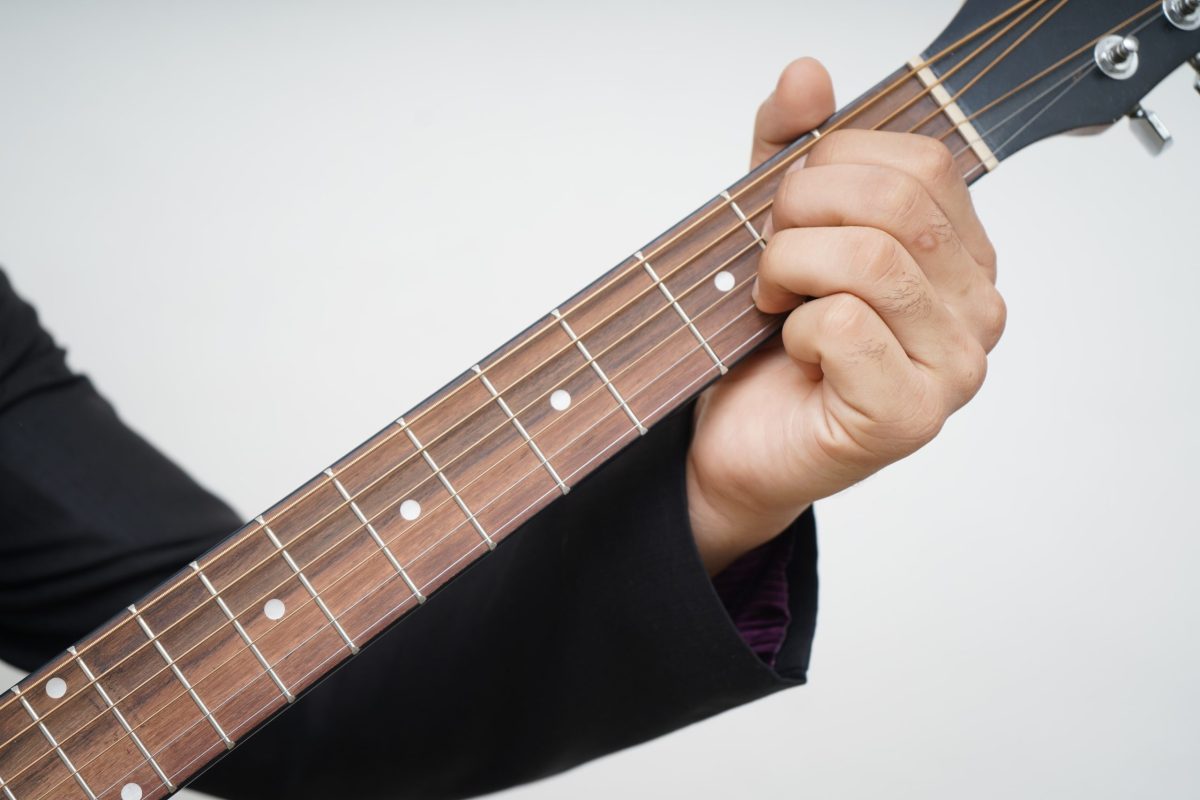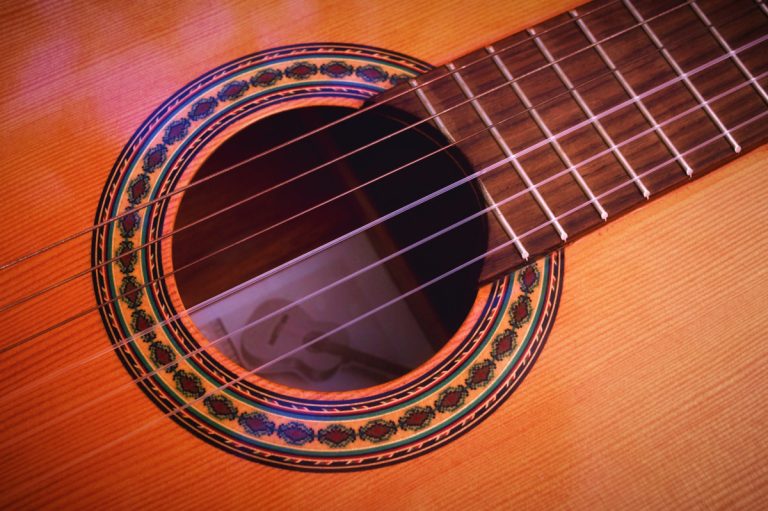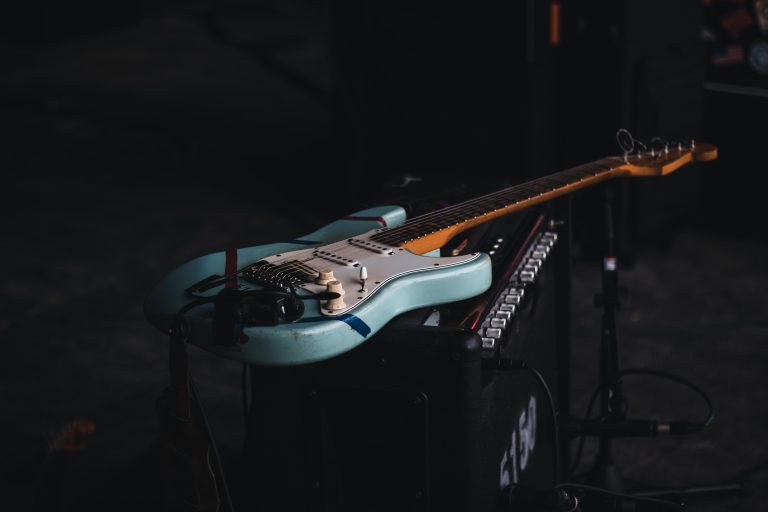Guitar strings are an essential component of playing the guitar. You can even feel the texture of the strings when you do. The material and construction of a string can greatly affect the sound it produces, for example, with thicker strings creating a fuller and richer sound, while thinner strings produce a brighter sound.
If you’re looking to try out different guitar strings and experiment with your sound, this guide is perfect for you! Whether you own an acoustic, classical, electric, or bass guitar, we have the best string recommendations for all of them. Keep reading as we strum through the best guitar strings today!
Why is Choosing Good Guitar Strings Important
Below we have created our list of the 5 best acoustic guitar strings, best bass guitar strings, best classical guitar strings, and best electric guitar strings!
You can’t really go wrong with any of them, but do read each option carefully to figure out which best acoustic strings are likely suited for you.
Acoustic Guitar Strings
Acoustic guitar strings are essential components when it comes to playing your instrument. They come in different materials, such as steel, nickel, brass or bronze, and each string has a particular thickness. Typically, acoustic guitars are fitted with six strings, producing a more natural sound without the need for amplifiers or pickups.
Our Pick Of Best Acoustic Guitar Strings
The best set of acoustic guitar strings is Martin M140.
There is a lot of competition on the market, and all of our mentions deserve a lot of credit, but the light strings from Martin win the race. We really love them.
Their strings are a great starting point for any music genre, offer a brilliant sound, and come at an affordable price. A win, win all around!
5 Best Acoustic Guitar Strings
ONE
D’Addario EJ17-3D Acoustic Guitar Strings
These non coated strings have phosphor-plated wrap wires which add a warmth and vibrant tone that suits most music applications. Introduced to the D’Addario line in 1974, this string is known for being extremely durable, a quality that is extremely important for the players putting hours of effort into the fretboard. This is by far the best value, high-quality string on our list.
The D’Addario string has phosphor-plated wrap wires which add warm and vibrant tones that suit different music genres. Introduced in 1974, it’s known for being extremely durable. So you can put hours of effort into the fretboard without worries. By far, this string sits on the top of our list for its value and high quality.
D’Addario EJ17-3D Acoustic Guitar Strings
One of the Best Acoustic Guitar Strings on the Market
TedScore: 9.5/10
Best Option For: All acoustic guitar players
String Gauges: Medium – 0.13 to 0.56
Features: Durable phosphor bronze coated string, that keeps their well-balanced and warm tone for a long time
Pros
- Durable medium strings
- Corrosion-free
- High-quality strings
Cons
- The strings have a longer length, and you need to cut them after assembling
TWO
Elixir Nanoweb Acoustic Guitar Strings
The Elixir NanoWeb Acoustic Guitar Strings are made of phosphor bronze and coated with NANOWEB® technology which makes them last longer and remain corrosion-free. These coated strings are also specially designed for a mellower and warmer tone.
Elixir is a premium brand that offers a wide range of options, including light and medium-string sets in both Nanoweb and Polyweb coatings. With these strings, you’ll definitely get your money’s worth, as they’re built to withstand the test of time while still maintaining their overall sound quality.
Elixir Strings 80/20 Nanoweb Coated Strings
Perfect Set of Strings for Players With Sweaty Hands
TedScore: 8/10
Best Option For: All styles of acoustic guitar players
String Gauges: Medium – 0.13-0.56
Features: Nanoweb-coated strings – clear treble sounds and last for a long time; phosphor bronze material
Pros
- A warm and vibrant tone
- Corrosion resistant
- Long-lasting
Cons
- A bit pricey
THREE
Fender 880L
Both beginner and professional guitarists admire the Fender 880L acoustic guitar strings for their smooth and friendly tonal character. These acoustic guitar strings are a hallmark of Fender’s commitment to producing high-quality guitar gear, and they’re designed to offer superior sound quality, durability and playability.
The strings feel smooth and silky under the fingers, which allows you to glide over the fretboard with minimal effort. This makes the Fender 880L ideal for beginners who are still developing finger strength and dexterity. On the other hand, they’re also perfect for more experienced guitarists who want to enjoy a comfortable playing experience.
This is a superb choice if you’re seeking a top-quality set of strings that delivers an excellent tone, feels great under the fingers, and is built to last.
Strings Resistant to Grime and Corrosion
TedScore: 8.5/10
Best Option For: Beginners and intermediate guitar players
String Gauges: Light – 0.12-0.54
Features: Top-notch quality; unique tone suitable for any music genre; five times longer lifespan than average guitar strings
Pros
- Long lifespan
- Mesmerizing acoustic tone
- Tuning stability
Cons
- The strings are in a “higher range” of the tone spectrum
FOUR
Martin M140 Acoustic Guitar Strings (Best Overall)
The Martin M140 is a unique set from the Martin Retro line of popular acoustic guitar strings. These strings feature solid nickel/copper wraps, which allow the natural wood tone to sing. With an extremely low-end, high-end snap and solid midrange, this is the best overall acoustic guitar string on our list.
These strings are highly regarded for their warm, balanced, consistent tone, and long-lasting durability. Made with high-quality materials, these strings have great tone and are perfect for any beginner or experienced guitarist who wants to elevate their sound.
The Martin M140 is made with phosphor bronze, which produces a bright tone and vibrant sound that suits various playing styles. Additionally, the strings are coated with a corrosion-resistant material that helps prevent rust and can extend string life.
Versatile Strings From a Reputable and Reliable Manufacturer
TedScore: 9/10
Best Option For: Versatile players who enjoy playing more than one genre of music
String Gauges: Light – 0.12-054
Features: Light, cheap, and sound fantastic; 80 to 20 bronze ratio
Pros
- Affordable
- Suitable for any genre of music
- Bright sound
Cons
- The core is not a 100% steel core
FIVE
Ernie Ball Earthwood PB
These are one of the best acoustic guitar strings, and are perfect for any player looking for a very warm sound, and friendly tone. These Ernie Ball Earthwood strings are made from a special blend of 92% copper, 7.7% tin, and 0.3% phosphorus wire wrapped around a brass-plated, hex-shaped core.
These strings produce a bright and clear sound that’s both rich and balanced, making them perfect for playing anything from soft ballads to heavy strumming. Plus, their extra durability makes them last longer than many other phosphor bronze strings available on the market. These strings also come in various gauges so that you can find the perfect fit for your playing style.
Ernie Ball Earthwood Phosphor Bronze
Perfect for Bending and Shredding on an Acoustic Guitar
TedScore: 9.5/10
Best Option For: Guitarists who like to solo on acoustic guitar
String gauges: Medium-light – 0.12-0.54
Features: The phosphor bronze acoustic guitar strings are of premium quality and tune together nicely with the bass and treble frequencies
Pros
- Rich, warm, and clear tone
- Great for solo performances
- The strings come in medium and light gauges
Cons
- The strings can snap easily
Classical Guitar Strings
Classical guitars are probably the most limited when it comes to sound. They have nothing else to rely on except for the strings. The classical guitar strings are made from nylon or plastic and play a crucial role in how the guitar plays, sounds, and feels.
Below, we have our top five classical guitar strings – but if you want a more in-depth article, we also have an article that contains 17 classical guitar strings that we recommend; check it out here.
Our pick of the best classical guitar strings
The D’Addario EJ27 are by far the best strings for a classical guitar. They are eco-friendly, resistant to corrosion, and offer warm tones.
The strings are manufactured in America in a neat package that keeps them fresh and in perfect condition.
Because the strings only come in normal and high tension, they can be especially great for experienced players who like a loud and consistent sound.
5 Best Classical Guitar Strings
ONE
D’ADDARIO EJ45 PRO-ARTE
COMFORTABLE AND SEMI-POLISHED STRINGS WITH FLATTENED WIRE
BEST OPTION FOR: Beginners Who Start Their Journey On A Classical Guitar
STRING GAUGES: 0.28-0.43
FEATURES: Semi-Polished Strings W
PROS
- Easy and balanced playing
- Pocket-pleasing price
- Normal and medium tension
CONS
- No hard tension set of strings
The TedScore™: 9/10
TWO
2. AUGUSTINE CLASSIC BLUE STRINGS
GREAT STRINGS FOR BLUES MUSIC
BEST OPTION FOR: Blues Players Who Play Slide And Experiment With Different Tunings
STRING GAUGES: 0.28 To 0.45
FEATURES: Clear Nylon Strings With Silver-Plated Copper
PROS
- Great responsiveness
- Versatile
- Produce a great tone
CONS
- Not eligible for beginners
The TedScore™: 8/10
THREE
3. ERNIE BALL 2409 ERNESTO PALLA NYLON BALL END
SMOOTH AND DURABLE STRINGS PERFECT FOR BEGINNERS
BEST OPTION FOR: Guitar Students Who Practice On A Classical Guitar
STRING GAUGES: 0.28 To 0.42
FEATURES: Smooth And Highly Durable Strings Made From Solid Nylon Monofilament
PROS
- Nylon trebles
- Clean sound
- High-quality strings
CONS
- The strings may be too light for professional players
The TedScore™: 8.5/10
FOUR
4. FENDER 130 CLEAR SILVER BALL END STRINGS
BEST COMFORT STRINGS FOR BEGINNERS AT A REASONABLE PRICE
BEST OPTION FOR: Beginners And Intermediate Players
STRING GAUGES: 0.28 To 0.43
FEATURES: Regular And Medium Tension; Solid, Dependable, And Very Easy To Play
PROS
- Affordable
- Balanced sound
- Decent volume and a high degree of tonal clarity
CONS
- No hard or extra hard tension
The TedScore™: 9/10
FIVE
5. D’ADDARIO EJ27
RELIABLE STRINGS FOR A CHEAP PRICE
BEST OPTION FOR: Guitar Players On A Budget
STRING GAUGES: 0.28 To 0.44
FEATURES: Made From Clear Nylon And Silver-Plated Copper; Offer A Loud And Consistent Sound
PROS
- Eco-friendly
- Corrosion-resistant
- Mellow tone
CONS
- The strings can break after heavy strumming
The TedScore™: 9/10
Electric Guitar Strings
Electric guitar strings are a set of six composite metal strings with varying thicknesses, known as gauge. These strings are essential for creating the unique sound of electric guitars. They’re used by both beginner and professional guitarists, whether in the studio or on stage.
There are hundreds of brands and variations to choose from, but the main materials used for electric guitar strings are steel and nickel since they’re magnetically conductive and transmit the string vibrations to the magnetic pickups on the guitar. Thinner gauge steel strings are easier on your fingers, while thicker ones offer a fuller tone.
Our Pick Of Best Electric Guitar Strings
We pick the Gibson Vintage Reissue as the best strings for an electric guitar.
The strings are medium light, a perfect balance for beginners and professionals alike, and are made from nickel wound steel. Plus, they come at a great price! What’s not to like!
5 Best Electric Guitar Strings
ONE
1. ERNIE BALL 2233 SUPER SLINKY
PERFECT SET OF STRINGS FOR STUDIO RECORDING
BEST OPTION FOR: Professionals And Beginners
STRING GAUGES: 0.09-0.42
FEATURES: These Nickel Steel Strings Offer A Warm And Resonant Tone Even When The Guitar Is Not Plugged Into An Amp
PROS
- Clarity throughout the entire fretboard
- Highly versatile
- The nickel plated steel strings sound great without an amp
CONS
- Not the best option for guitarists who like a dark tone
The TedScore™: 9/10
TWO
2. D’ADDARIO EXL 110-3D
THICKER STRINGS THAT CAN EASILY BE BENT AT HIGHER FRETS
BEST OPTION FOR: Guitarists Who Experiment With Drop Tunings
STRING GAUGES: 0.10-0.46
FEATURES: Thick Strings Perfect For Frequent Tuning Changes
PROS
- Durable
- Best for drop tunings
- High-end performance
CONS
- Some beginners find the thicker gauge uncomfortable
The TedScore™: 8.5/10
THREE
3. D’ADDARIO NYXL 1046
BEST STRINGS OFFERING TUNING STABILITY AND SNAPPING RESISTANCE
BEST OPTION FOR: Rhythm Guitar Players
STRING GAUGES: 0.10-0.46
FEATURES: High-Carbon nickel plated steel strings; Resistant To Breaking; Offer Particularly Warm Sounds In The Middle Of The Fretboard
PROS
- Great for power chords and chords
- The strings preserve your finger stamina
- Long lasting
CONS
- Not the best option for solo players
The TedScore™: 9/10
FOUR
4. GIBSON VINTAGE REISSUE
STRINGS MANUFACTURED EXACTLY THE SAME AS GIBSON STRINGS IN THE 50S
BEST OPTION FOR: Nostalgic Guitar Players Who Enjoy A Vintage Tone
STRING GAUGES: 0.11-0.50
FEATURES: Wrapped In Pure Nickel And Express A Lot Of Midrange Warmth
PROS
- Great for rock, blues, and country songs
- Old-school sharp sound
- Affordable price
CONS
- The strings don’t pair well with modern amps
The TedScore™: 9/10
FIVE
5. ELIXIR STRINGS NANOWEB 12052
TOP STRINGS OFFERING A GLISTENING TONE AND EXCEPTIONAL DURABILITY
BEST OPTION FOR: All Electric Guitar Players
COMES WITH: 0.10-0.46
FEATURES: The Strings Reduce Finger Fatigue Because Of Their Coating And Make The Sharp Chords Easy To Play
PROS
- Last longer than average strings
- Smooth feel
- Ultra-thin coating
CONS
- Some players are not fans of the coating that Elixir strings have
The TedScore™: 9/10
Bass Guitar Strings
Bass guitar strings help produce the deep and groovy sound that characterizes bass guitar music. Unlike acoustic or electric guitars that have six strings, bass guitars usually have only four thicker strings. These strings are named for the keynotes they produce when played as open strings. Additionally, it’s important to consider string gauge or thickness, when choosing your bass strings. Heavier gauges produce a thicker sound, while lighter gauges offer a more lightweight feel.
Our Pick Of Best Bass Guitar Strings
The Rotosound Tru Bass 88 is, in our opinion, the best full set up of strings you can buy for your bass. Despite being more old-school oriented, the strings are versatile and great for old and new music.
They have been used by many music icons and last for a long time because of their flat-wound nylon winding.
You will love them!
5 Best Bass Guitar Strings
ONE
1. ERNIE BALL REGULAR SLINKY NICKEL BASS
HIGHLY POPULAR STRINGS USED BY MANY PROFESSIONAL MUSICIANS
BEST OPTION FOR: Bass Players Who Are Into Modern Pop-Rock Music
STRING GAUGE: Available In Multiple Gauges From 40-95 To 55-110
FEATURES: The Strings Offer A Contemporary Tone, Are Durable, And Come In Many Gauges
PROS
- Bright tones
- Durable
- Low price
CONS
- No vintage tones
The TedScore™: 9/10
TWO
2. ROTOSOUND JAZZ BASS 77
SUSTAINABLE AND PERFECTLY BALANCED BASS STRINGS
BEST OPTION FOR: People Who Enjoy Music From The 70s
STRING GAUGE: Available In Different Lengths And Gauges; Set For Bass Guitars With Five Strings
FEATURES: The Strings Produce Vintage Sound With Brighter And Deeper Tones Than Traditional Strings
PROS
- Durable
- Vintage tones
- Contemporary sound
CONS
- Expensive
The TedScore™: 9.5/10
THREE
3. D’ADDARIO NYXL BASS
A PERFECT SET OF STRINGS FOR DARKER TONES
BEST OPTION FOR: Players Who Enjoy More Than One Type Of Music Genre
STRING GAUGE: Four-String, Five-String, And Six-String Gauges Are Available
FEATURES: The Bass Strings Have A Midrange Clarity And Produce Harmonic And Rich Sound
PROS
- Eligible for all music styles
- Premium-quality
- Warm tone
CONS
- The strings are not suitable for players who like a brighter tone
The TedScore™: 8/10
FOUR
4. ROTOSOUND TRU BASS 88
STRINGS USED BY THE BEATLES, DAVID BOWIE, AND OTHER ROCK ICONS
BEST OPTION FOR: Players Who Like To Keep The Funk Alive
STRING GAUGE: Short Scale, Medium Scale, Long Scale, Extra Long Scale
FEATURES: Flatwound Winding And A Core From Stainless Steel; Smooth Strings
PROS
- Great for blues, funk, and soul music
- Eligible for fretless bass guitar
- Offer warm tones
CONS
- The strings are not as versatile as others
The TedScore™: 9/10
FIVE
5. D’ADDARIO XT NICKEL PLATED BASS STRINGS
BOLD AND BOOMING STRINGS CREATED TO BRING OUT THE BEST SOUND POSSIBLE
BEST OPTION FOR: Beginners And Professional Musicians
STRING GAUGE Multiple Gauges Are Available; There Are Six-String Packs And Strings For GS Mini Bass
FEATURES: Nickel-Plated And Offer Warm, Bright, And All-Around Tones; Sound Like New For A Long Time
PROS
- Sound fresh for a long time
- Versatile
- Produce warm and bright tones
CONS
- Some players consider the sound too bright
The TedScore™: 9/10
How to Change Guitar Strings
Here’s a step-by-step guide on how to change your guitar strings and get that fresh sound you’ve been wanting!
1. Remove the Strings and Hardware. To begin changing the strings, remove the old ones. Detune each string until it’s completely loose, and then cut it. If you have a tremolo system, remove one string at a time.
2. Remove the Pins and Clean the Fretboard. After removing the strings, use a string winder to remove the bridge pins. Be sure to be gentle to avoid marking your guitar’s wood. Then, clean the fretboard to ensure a smooth playing surface.
3. Choose New Strings. There are many types of guitar strings available, each offering different tones and playability. Choose the right ones for your playing style and feel.
4. Put on the New Strings. Start by lining up the tuning peg with the nut slot and pulling the string through the hole of the tuning peg until there’s about 2″ (5cm) of slack. Then, wrap the string around the peg, and tune it up to pitch.
5. Stretch and Tune the New Strings. After a few rounds of tuning the strings, pull them away from the fretboard gently to stretch them. Keep tuning until the string is holding its pitch.
When Should You Change Your Guitar Strings
You should change strings every three months or after 100 hours of practice, whichever comes first. It makes a big difference! However, if you notice your strings aren’t holding tune as well as they used to or they lack brightness and sustain, it may be time to change them sooner. For the casual player, restringing every two or three months should be enough, while pro guitarists may change their strings weekly. Ultimately, it all depends on your own playing technique, style and personal preference.
Tools You Need for Guitar Stringing
Having a few tools will make the process of changing guitar strings a lot easier and smoother. You don’t want to struggle with jammed bridge pins, prickly strings, or hard-to-reach places. With these tools, you can adjust the tension easily and cut the excess strings neatly. Plus, having these will save you a lot of time and hassle.
D’Addario Guitar Pro-Winder String Winder/Cutter
THE ULTIMATE RESTRINGING TOOL
Perfect For: All guitars, banjos & mandolins
Features:
With integrated bridge pin puller for acoustic instruments
Designed for efficient and comfortable use
Comes with a built-in string cutter
Pros:
Specifically designed to cut bass or guitar strings
Can cut strings even at sizes above 3mm
Cons:
None!
The TedScore: 10/10
CruzTOOLS String Cutter Guitar/Bass
FOR CUTTING STRINGS EASILY
Perfect For: Guitar and bass strings
Features:
Built with a compact five-inch length
With vinyl grips for secure use
Has heat-treated blades for accurate string cutting
Pros:
Specifically designed to cut bass or guitar strings
Can cut strings even at sizes above 3mm
Cons:
None!
The TedScore: 10/10
Summary – 20 Best Guitar Strings
Choosing the best strings for your guitar can give you many benefits, including improved intonation stability, better tonal quality, and increased playability.
So if you’re on the search for a better guitar tone, then finding the right strings is essential! Remember, the quality of your guitar strings is much more important than the brand, so take some time to find the right ones for you and your musical journey.
We hope that this article helped you decide on purchasing the best guitar string to take your strumming to the next level, and keep playing the music you love with clarity and precision!
We’d love to hear your best pick, do let us know in the comments!
FAQ’s
Which guitar string is best?
You’ll love playing on the Martin M140 light bronze acoustic guitar strings. These strings produce great tone, pitch accuracy, and longevity of sound. Plus, they don’t stretch or get out of tune easily.
What strings do most guitarists use?
Most professional guitar players prefer using medium/hybrid gauge strings like flat-wound strings. They find them more stable in tune and less harsh on their fingers. However, many great guitarists, including Jimi Hendrix, Brian May, Billy Gibbons, and B.B. King, prefer using light gauge strings.
What guitar strings have the best tone?
Some popular options to consider are 80/20 bronze strings for a brighter, more pronounced top-end, and phosphor bronze strings for a mellower, well-balanced tone. Among the top brands for phosphor bronze guitar strings are D’Addario, Elixir, and John Pearse.
Which string is number 1 on a guitar?
The number 1 string on a guitar is actually the thinnest one. We call it the high E string or 1st string. The other strings used on the guitar are numbered from 1 to 6, going from thinnest to thickest.
Can you use electric guitar strings on an acoustic?
While it’s possible to use electric guitar strings on acoustic guitars, it’s not always the best idea. The output will be much less on acoustic strings because they are less magnetic. We recommend sticking to acoustic guitar strings for the best sound.





